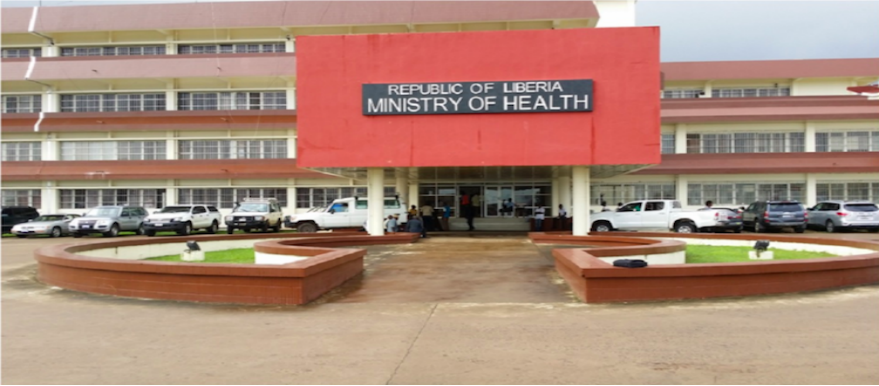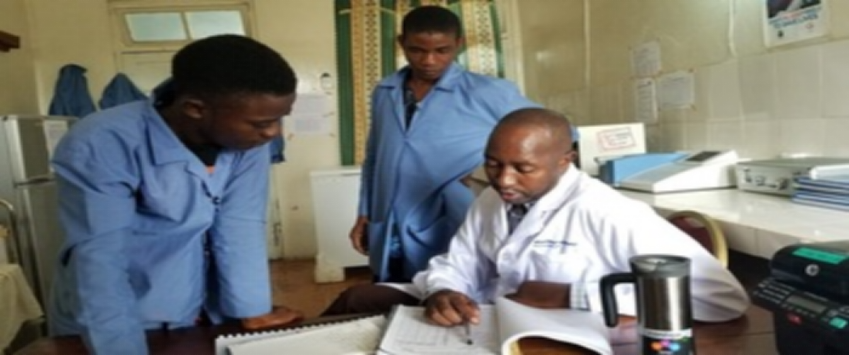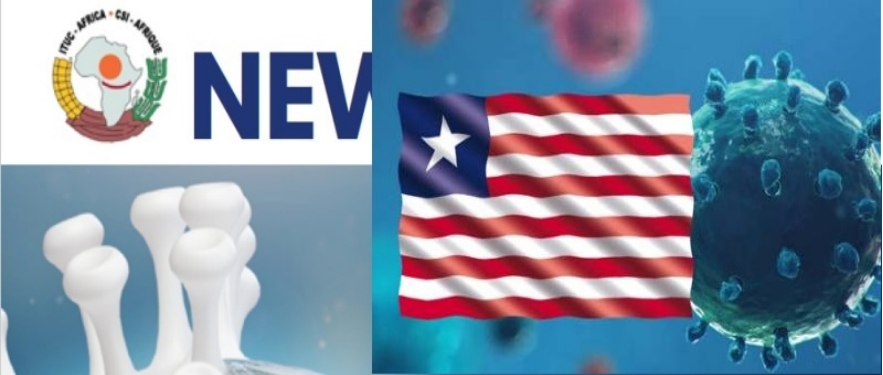1.0. Introduction
Improving healthcare system is key to every nation to provide good health service to the population. The effective healthcare delivery function through service provision, resource generation, financing and stewardship (WHO, 2002). The Liberian healthcare system faces various systemic challenges. The healthcare system in Liberia lacks infrastructure, adequate staff, advanced medical instruments, data process technology and sufficient financial and insurance resources. These challenges have affected the quality healthcare services in Liberia. In relation to this, African leaders with the support from global health community have initiated, formulated and implement policies and programmes for effective and quality healthcare delivery. In addition, the government has also allocated funds to support healthcare services and the improvement of the infrastructural facilities.

Source: https://frontpageafricaonline.com
2.0. Health Care System in Liberia
The Ministry of Health and Social Welfare (MoHSW) have embarked on needed investment in order to build a sustainable health system and to curb the challenges. The Ministry has set up financial systems, monitoring, evaluation policies and programs and strategies to improve capacity planning within the health sector in Liberia. In the year 2014-2015, the outbreak of Ebola virus disease (EVD) affected the whole economy of Liberia including the health sector. The outbreak changed the Liberian Health Sector and health policies, plans, strategies at the national level was implemented in order to curb and control the virus. Also, international donors supported the Liberian Government in their course to control the virus through financial supports, equipment and medical staff to support the existing local ones (Wendelboe et al., 2018; Kodish et al., 2019; Simen-Kapeu et al., 2021). At the same time, the healthcare system in Liberia faced challenges such as lack of appropriate qualified staff, insufficient infrastructure and limited oversight capacity (Vapattanawong et al., 2007). Consequently, the government introduced reconstructive efforts around a Basic Package of Health Services (BPHS). The BPHS aimed at ensuring equitable distribution of health service in the country. Moreover, the Government in order to deal with communicable and outbreaks, the BPHS initiative is to rebuild and staff health facilities, recruitment and training of community health volunteers (CHVs) and provision of quality health care service delivery. In 2011, the Government of Liberia upgraded the BPHS initiative to Essential Package of Health Services (EPHS) that includes a comprehensive program for child health.
3.0. Health Policies and Systems
The Government of Liberia engaged the community in the health systems in order to respond to challenges faced in provision of health services. In Liberia, the community health program development process in Liberia started in the year 2007 before the outbreak of Ebola. The program was first piloted through Integrated Community Case Management (iCCM). This was done to detect the effective implementation of the community health program in Liberia. It was found that iCCM could help assist the general community health volunteers with adequate supervision and supplies (Pfaffmann Zambruni et al., 2017). However, the implementation of the community program has some limitations including poor data management, lack of supervision and incentive, limited community involvement, and stock-out of medicine. Under the implementation of the community health program development process, the following was outlined: leadership and governance, training and motivation.
The management and the authorities realized the significance of the community health policy for effective implementation of health programs. The leadership found that communities played a significant role through information sharing, educational campaigns and promotions and financial supports during the Ebola outbreak. In addition, the community’s involvement through contract tracing and others influence the community health policy in Liberia.
In addition, the community volunteers were given standardized training to be selected by their community for the position. The Ministry of Health (MOH) merged with the National Public Health Institute on Liberia (NPHIL) to help reduce the risk of epidemics and improve access to secure and high-quality health services to all citizens. The MOH and the NPHIL at collaboration seeks to improve the health system in three main areas:
· Laboratories – improving capacities to provide quality-assured laboratory diagnostics to control potential outbreaks or pandemic.
· Disease surveillance and response – improving the system for reporting notifiable diseases.
· Human resource development – developing and training of health care workers.
3.1. Supports from the United State of America
The United States has supported and contributed to the Liberian Health sector to revive and recover the health system post-Ebola. The Agency USAID through the US Government engaged the Ministry of Health in Liberia to help rebuild the health sector. In 2009, the US contributed 22% of the Liberian health budget. The USAID primary areas include family planning and reproductive health and child health, HIV/AIDS and Malaria.
In addition, the USAID funded Rebuilding Basic Health Service (RBHS) equaled 62m dollars and sponsored a four-year program with the NGO’s to provide health services to government clinics in Liberia. The Fixed Amount Reimbursement Agreement (FARA) from USAID was initiated to provide channel of fund to the Liberians through their central bank. This was arranged to be paid back by the MoHSW after achieving the set target.
3.2. E-Health Management System
Due to the influx of technology, the Liberian healthcare system have seen an improvement ranging from traditional treatment to the modern medicine treatment with the support of Information Communication Technology (ICT) in our healthcare management system. In this regard, the Liberian Government have emphasized on the fusing the information technology into the healthcare delivery system in the country. The Government of Liberia provided a comprehensive guide policy direction for the successful implementation of the Electronic Health Management Information System with the intended purpose of processing, storing, sharing and managing accurate comprehensive health statistics throughout the country for effective delivery of healthcare service. The implementation of the E-Health Management System has seen significant improvement in the Liberian Health Sector. The detection of reactions of the patients, effective monitoring, provision of training and development to the health workers, quality healthcare service delivery and education and promotion to the urban and rural areas in Liberia, effective electronic logistic management information system are some of the benefits being derived from the successful implementation of E-Health Management Information (Amara, 2020).
In addition, a study by Amara (2020) suggests that electronic medical records in both public and private institutions, health insurance information system and automated drug utilization system for the strengthening of e-health and Liberia Healthcare delivery system.

Source: https://www.giz.de/en/worldwide/100169.html
1.0. COVID-19 - Response from Liberia
The Government of Liberia declared a nationwide lockdown on the 8th April 2020, to stop the spread of the coronavirus. The borders were closed from entry and exiting after the country recorded more than 200 confirmed cases of COVID-19. In addition, the Government collaborated with the United Nations (UN) and other donor Partners, the Ministry of Health and the National Public Health Institute of Liberia (NPHIL) put in place measures called the National Multi-sectoral Response Plan (NMRP) to COVID-19. During the pandemic, the International Monetary Fund (IMF) relief the debt services of Liberia on the 13 April for their support to fight against the pandemic.
Also, grant leaves were given to the non-essential employees in the Public Service. The Liberian Government provided free electricity and water supply to the people. The Trade Union in Liberia increased the awareness and educate the workers on the various preventive measures by the Ministry of Health and helped in the distribution of foods to the communities and supported the other implementation actions of the COVID 19 response plan by the Ministry and the government.

Source: http://www.ituc-africa.org/COVID-19-Response-from-Liberia.html
In conclusion, the COVID-19 pandemic has exposed the weakness of the economic and social fabric in Liberia. The Government of Liberia has put in measures and controls to minimize the spread of the virus in the country. Therefore, the citizens must adhere to all the measures and protocols by the government.
References:
[1]African Region Organization of the International Trade Union Confederation, ITUC-AFRICA. Accessed at http://www.ituc-africa.org/COVID-19-Response-from-Liberia.html
[2]Amara Q. M. (2020). A Critical Look at the Importance of E-Health Management System In Building A Resilient Healthcare System In Liberia. Accessed at https://frontpageafricaonline.com/opinion/commentary/a-critical-look-at-the-importance-of-e-health-management-system-in-building-a-resilient-healthcare-system-in-liberia/ Nov 12, 2021.
[3]Downie R (2012). The Road to Recovery, Rebuilding Liberia’s Health System, Centre for Strategic and International Studies (CSIS). Accessed at file:///C:/Users/PC/Downloads/120822_Downie_RoadtoRecovery_web.pdf
[4]Kodish, S. R., Simen-Kapeu, A., Beauliere, J. M., Ngnie-Teta, I., Jalloh, M. B., Pyne-Bailey, S., Schwartz, H., & Wirth, J. P. (2019). Consensus building around nutrition lessons from the 2014–16 Ebola virus disease outbreak in Guinea and Sierra Leone. Health Policy and Planning, 34(2), 83–91. https://doi.org/10.1093/heapol/czy108
[5]Liberian Ministry of Health and Social Welfare. National Health Policy/National Health Plan. Monrovia, Liberia: 2007.
[6]Liberia Ministry of Health and Social Welfare. Community Health Roadmap 2014–2017. Monrovia, Liberia: 2014. Available online at: http://pdf.usaid.gov/pdf_docs/PA00KBFN.pdf.Accessed Nov 11, 2021.
[7]Liberia Ministry of Health and Social Welfare. Essential Package of Health Services. Monrovia, Liberia: 2011. Available online at: http://apps.who.int/medicinedocs/documents/s19808en/s19808en.pdf.Accessed Nov 11, 2021.
[8]Ministry of Health and Social Welfare (2017). National Health Policy, Government of Liberia.
[9]Pfaffmann Zambruni F, Rasanathan K, Hipgrave D, Miller NP, Momanyi M, & Pearson L. Community health systems: allowing community health workers to emerge from the shadows. Lancet Glob Health. 2017;5:e866-7.
[10]Simen-Kapeu, A., Lewycka, S., Ibe, O., Yeakpalah, A., Horace, J. M., Ehounou, G., Boima, T., & Wesseh, C. S. (2021). Strengthening the community health program in Liberia: Lessons learned from a health system approach to inform program design and better prepare for future shocks. Journal of Global Health, 11. https://doi.org/10.7189/jogh.11.07002
[11]Vapattanawong, P., Hogan, M. C., Hanvoravongchai, P., Gakidou, E., Vos, T., Lopez, A. D., & Lim, S. S. (2007). Reductions in child mortality levels and inequalities in Thailand: analysis of two censuses. The Lancet, 369(9564), 850–855. https://doi.org/10.1016/s0140-6736(07)60413-9
[12]Wendelboe, A. M., McCumber, M., Erb-Alvarez, J., Mould, N., Childs, R. W., & Regens, J. L. (2018). Managing emerging transnational public health security threats: lessons learned from the 2014 West African Ebola outbreak. Globalization and Health, 14(1). https://doi.org/10.1186/s12992-018-0396-z
[13]World Health Organization (2003). The World Health Report, WHO, Geneva.
World Health Organization (2002). Health, Economic Growth, and Poverty Reduction. The Report of Working Group I of the Commission on Macroeconomics and Health - Executive Summary. WHO, Geneva.
[14]World Health Organization (2010). Monitoring the building blocks of health systems: a handbook of indicators and their measurement strategies. Geneva: WHO; 2010.
[15]World Health Organization (2012). The Report of a Multi-Country Study. Health Systems in Africa Community Perceptions and Perspectives, Accessed at https://www.afro.who.int/sites/default/files/2017-06/english---health_systems_in_africa---2012.pdf